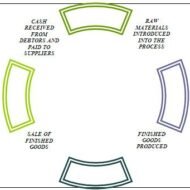Posted by Managementguru in Financial Accounting, Financial Management
on Dec 29th, 2014 | 0 comments

Scope of Financial Management Facebook Buys WhatsApp: Boneheaded or Brilliant? This was the title of a Forbes Article when Mark Zuckerberg acquired Whatsapp for $19 billion dollars, the price that may exceed the GNP of some of those countries. Mark is said to be an unconventional thinker and the WhatsApp acquisition shows Facebook’s determination to follow the road not yet paved. It is a bold move, yet filled with risks along the way. This is one of the finest examples of the big investment decisions of recent times and the right course of action, if you measure the number of potential users of the mobile messaging service rather than the cost of acquiring each user and the potential for selling ads to each user today. Follow these mind blowing tips to become prosperous Picture Courtesy : YoungHstlrs Financial management is one of the important aspects of overall management, which is directly asscoiated with various functional departments like personnel, marketing and production. Financial management embraces wide area with multidimensional approaches. The following are the important scope of financial management. Some of the major scope of financial management are as follows: 1. Investment Decision 2. Financing Decision 3. Dividend Decision 4. Working Capital Decision. 1. Investment Decision: The investment decision involves Risk EvaluationMeasurement of cost of capital andEstimation of expected benefits from a project. Capital budgeting and liquidity are the other two major components of investment decision. Capital budgeting takes care of the distribution of capital and commitment of funds in permanent assets to harvest revenue in future. Capital budgeting is a very focal decision as it impacts the long-term success and growth of a firm. All the same it is a very tough decision because it encompasses the estimation of costs and benefits which are uncertain and unknown. Picture Courtesy: Crowdfundingheroes 2. Financing Decision: Financing decision is related to financing mix or financial structure of the firm. The raising of funds requires decisions regarding Methods and sources of financeRelative proportion and choice between alternative sourcesTime of floatation of securities, etc. In order to meet its investment needs, a firm can raise funds from various sources. Long Term Sources of Finance: Share Capital or Equity SharesPreference Capital or Preference SharesRetained Earnings or Internal AccrualsDebenture / BondsTerm Loans from Financial Institutes, Government, and Commercial BanksVenture FundingAsset SecuritizationInternational Financing by way of Euro Issue, Foreign Currency Loans, ADR, GDR etc. Picture Courtesy: Cash & Treasury Management file Medium Term Sources of Finance: Preference Capital or Preference SharesDebenture / BondsMedium Term Loans fromFinancial InstitutesGovernment, andCommercial BanksLease FinanceHire Purchase Finance Short Term Sources of Finance: Trade CreditShort Term Loans like Working Capital Loans from Commercial BanksFixed Deposits for a period of 1 year or lessAdvances received from customersCreditorsPayablesFactoring ServicesBill Discounting etc. 3. Dividend Decision: In order to accomplish the goal of wealth maximization, a proper dividend policy must be established. One feature of dividend policy is to decide whether to distribute all the profits in the form of dividends or to plough back the profit into business. While deciding the optimum dividend payout ratio (proportion of net profits to be paid out to shareholders), the finance manager should consider the following: Investment opportunities available to the firmPlans for expansion and growth,Dividend stabilityForm of dividends, i.e., cash dividends or stock dividends, etc. 4. Working Capital Decision: Working capital decision is related to the FINANCING in current assets and current liabilities. Current assets include cash, receivables, inventory, short-term securities, etc. Current liabilities consist of creditors, bills payable, outstanding expenses, bank overdraft, etc. Current assets are those assets which are convertible into cash within a year. Similarly, current liabilities are those liabilities, which are likely to mature for payment within...

Posted by Managementguru in Financial Management
on Feb 25th, 2014 | 0 comments

Venture Capital and Traditional Financing- Comparison of Advantage Venture capital is a new form of financing that has come as a boon for young entrepreneurs and it plays a strategic role in financing small scale enterprises and high technology and risky ventures. In all the developed and developing nations it has made its mark by providing equity capital, so, they are more like equity partners rather than financiers and they are benefited through capital gains. Don Valentine is known as "the grandfather of Silicon Valley Venture Capital". He was one of the original investors in Apple, Atari, LSI Logic, Cisco Systems, Oracle, and Electronic Arts back in the 1970s. So he has a top notch track record. Here are some of his quotes:— Lion (@Lion_Investor1) July 27, 2021 Venture capitalists evaluate the risk using the following factors: Management TeamCompetitive AdvantageMarket PotentialBarriers to entryExit Strategy Banks’ Stand Towards First Generation Entrepreneurs Young and growing businesses need capital at the right time, not only to float their company in the market but also to survive in the long run. When financial institutions like banks and other private financial organizations hesitate to take the risk of early stage financing, since the credibility of the budding firm is not established, venture capital firms comes into the foray to fund the project in the form of equity which can be termed as “high risk capital”. Venture Capitalist is like an Equity Partner Although there is a misconception that the interest of venture capital firms is mainly driven by cutting edge technology in the industry, it is not always the case with all venture capital firms. A venture capitalist associates high risk with huge profits; of course after thoroughly analyzing the prospects and consequences and the viability of the project. The venture capitalist becomes a partner with the entrepreneur in his business. True venture capital financing need not confine itself to high end technology products. Any risky idea with great potential can be financed and venture capital is an all powerful mechanism to promote and institutionalize entrepreneurship. Focus on Growth Mainly venture capital focuses on growth. A venture capitalist is very much interested to see a small business growing into a larger one. He assists in setting up the business, funding it and travels all along to see the firm grow. If it is potential equity participation, the venture capitalist can come out of the partnership once the company becomes profitable and take back his money by selling the shares or convertible securities. If the firm opts for a long term investment from the venture capital finance, the financier has to develop an investment attitude for a long term, say five or ten years to allow the company to make large profits. Active Participant in the Operations of the Firm Another form of financing is that the venture capitalist has his hands on management by which he becomes an active participant in the operations of the firm and his thinking is streamlined as to how to multiply and make quick money which is a win-win situation for both sides. Not only finance, the venture capitalist also contributes to marketing, technology upgradation and management skills to the benefit of the new firm. Venture Capitalist- Banker, stock market investor and an entrepreneur in one. The venture capitalist’s management approach is significantly different from that of a banker whose prime concern is collaterals and securities in the form of assets. He keeps his hands off the management and plays safe. The venture capitalist can also not behave like a stock market investor who invests money without having thorough knowledge about the company’s business and management. He combines the qualities...

Posted by Managementguru in Financial Accounting, Financial Management
on Feb 21st, 2014 | 0 comments

Applications of fund Purchase of fixed assets – leads to outflow of funds, but at the same time adding assets to your organization always improves the financial position of your firm. You can also use these assets as “collaterals” for availing loans in banks. Redemption of preference shares – you have to apportion your operating profit in order to satisfy the preference share holders with interest. This will give you a clear idea of the earnings available for the equity share holders. Fund that is lost during business operations – Due to wrong investments and credit policies, sometimes your funds get sticky and recovery becomes next to impossible. Repayment of loans – although the fund goes out, you free yourself from further interest burden and reduce your credit limit with the bank. Remember,it is better to repay the loans from your profit. Redemption of debentures – It is easy to raise money from debentures, because people are rest assured of their payment at a fixed date. But the cost of servicing the debt might sometime exceed the concessional advantages on raising such securities. https://gumroad.com/l/wqbu A systematic study of fund flow facilitates in ascertaining the soundness of your firm’s financial condition and it also helps to formulate the right kind of dividend policies. Net working capital is the life line of a firm’s day-to-day operations and we can surely say that a company is prosperous if it has a surplus of net working capital at any given point of time. The financial manager of your company should have the vision to predict changes in the stock market and play the cards accordingly. It needs an in-depth understanding and analysis of the market conditions with a wider...






